#Tobit 1
Text
the only list of information I've ever successfully memorised was that when I was ten i learned all the books of the (protestant) bible and can still recite them but that doesn't help me very often because I'm an agnostic medievalist and keep having to deal with random bonus books that we didn't have when i was a kid
so now i can list 66 of them in order and if you're a protestant that's very impressive. and then i can give you an assorted handful of apocrypha and it's up to you what you wanna do with those
#me looking at tobit: who r u. why are you here#i have also memorised one (1) poem#that's it that's all I've got for you#i must have read the Táin approximately fifty times by now and i still forget what happens in it. brain like a fucking sieve
7 notes
·
View notes
Text
Do good and evil will not overtake you
Daily Verse Reading – Tobit 12: 1; 5-15; 20
Tobit 12:1
Raphael’s Wages12 When the wedding celebration was ended, Tobit called his son Tobias and said to him, “My child, see to paying the wages of the man who went with you, and give him a bonus as well.”
Tobit 12:5-15
5 So Tobias[a] called him and said, “Take for your wages half of all that you brought back, and farewell.”
Raphael’s…

View On WordPress
0 notes
Note
now i came across the book of tobit that Asmodeus is a wrath demon and has been used in fictional media, but could we see Asmodeus using lust and wrath? But not like how Satan is presented?
Yes, definitely!!
Within general demonology, the seven deadly sins' demon representations can actually vary a bit. Some interpretations have Asmodeus as the demon of lust, while others have him as wrath. And in fact, Asmo's name actually can translate as being derived from the word for wrath! But, in the case of OM, they have seemingly gone with Binsfeld's classification, which is perhaps the most prevalent.
That said, even as OM's Avatar of Lust, Asmo has certainly been shown to also be quite wrathful when he's angry.
For one, his "losing" battle sprites are the only ones besides Satan's to show true anger, consumed by flames and breaking his phone in OG while very pissed and about to break his mic in Nightbringer.

And then we have all the various moments in the games that point to Asmo's wrath, a few of which we've shared below.
(minor Nightbringer spoilers below the cut)
First, we have the classic OG season 1 Asmo, which was a more cruel, cold wrath.
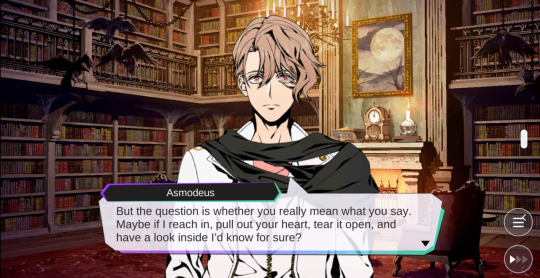
We also have Beelzebub mentioning that both Satan and Asmodeus scare him/are scary when angry.
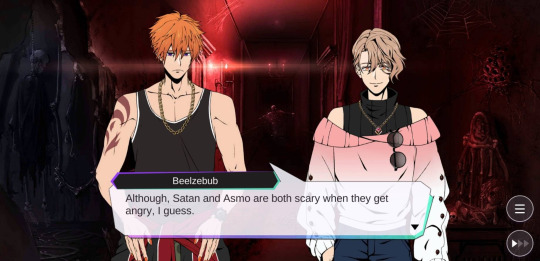
In Nightbringer Lesson 7 - Hard, aptly titled "Two Terrors", we have Asmodeus ready to kill everyone when he finds out they destroyed his room in the process of hiding from a wrathful Satan -- and ends up scaring said wrathful Satan himself.
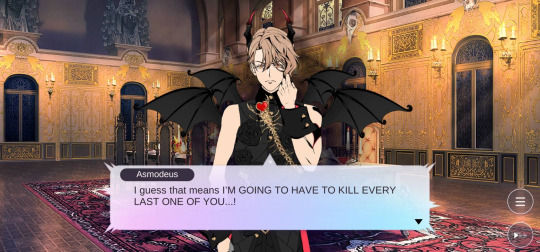
Most recently, we've seen Asmodeus straight-up ready to pummel Mammon.
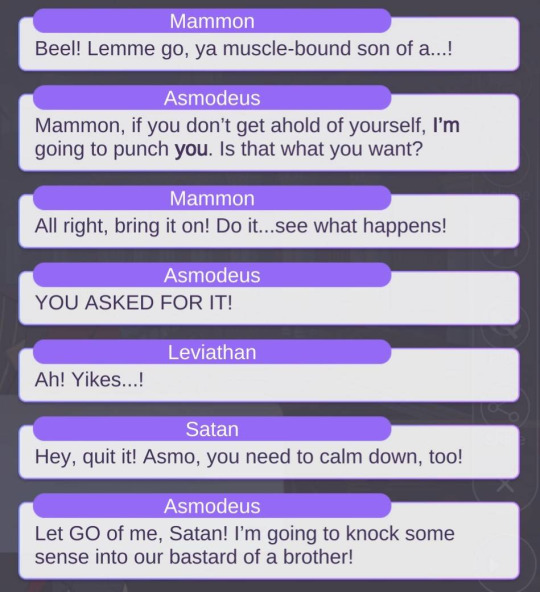

And of course, we can't leave out this lovely little panel from the mini-comics the official Obey Team shared a while back, where Asmo gets pissed that Mammon fell asleep while doing his nails.

So indeed, it's not quite the same as Satan's wrath, but Asmodeus is most definitely terrifying when he's mad!
Anyway, for our part, we strongly believe that being the Avatar of Lust includes bloodlust, as well. 🥰
#we love wrathful asmo here <3#especially unhinged wrathful asmo#ask and ye shall be answered#obey me#obey me asmodeus#obey me asmo#om! asmodeus#om! asmo#obey me!#obey me swd#obey me shall we date#omswd#obey me nightbringer#obey me nb#obey me nightbringer spoilers
550 notes
·
View notes
Note
You ever read the "apocrypha" books of the Bible? (like Maccabees 1 & 2, Judith, Tobit, Wisdom, etc?)
Judith is a very cool story if you haven't-
I have a book on it! I'll read it at some point when I'm less busy haha. I've read Susanna which is very fun and a little bit of Judith
122 notes
·
View notes
Text
Origin of the names of the angels
Since I have done a post on the origin of the names of the seven kingdoms of Hell, may as well do the origin of the names of the angels.
Warning, this post contains religious content. If you are not comfortable, please ignore this.
Now let's go on with our trivia post
Seraphim
Now I just want to make a distinction. The Seraphim irl are called "the Archangels", but that doesn't mean they belong to the rank of archangel, the second-to-lowest rank, it only means they are the leaders and chieftains of all the angels, including other Seraphim.
Also, Michael, Gabriel and Raphael are the only named angels in the Bible.
Michael
"Michael" means "Who is like unto God?" in Hebrew. In the Bible, Michael is described as "the great prince, who standeth for the children of thy people" (Daniel 12:1), the angel who disputed with the devil over the remains of Moses (Epistle of St. Jude verse 9), the leader of the heavenly army fighting against the dragon (Revelation 12:7).
In the Christian tradition, Michael is the leader of God's army fighting against Satan, helper of the faithful Christians at the moment of death, champion of God's people, protector of the Jews under of the Old Testament, and of God's Holy Church. He is also the patron of many chivalric order of knights.
Michael, having led the battle against Lucifer, is the greatest of all angels, no angel could surpass him in honor and glory.
The feast day of St. Michael in Western Christianity is held on September 29, commemorating the dedication of first church built in his honor in Western Europe. In Eastern Christianity, St. Michael and all angels have their commom feast day on the 8th of November.
Gabriel
"Gabriel" means "strength of God". In the Bible, he appears as the messenger of God who delivers messages of utmost importance: he tells the Prophet Daniel two prophecies concerning the successive empires and the time elapsing before the coming of Christ (Daniel chapter 8 & 9), he appears before Zachary and foretells that his son will be the Precursor of the Lord (Luke 1:5-25), and most importantly Gabriel announces to the Virgin Mary the Incarnation of the God the Son and that she is going to become the Mother of God (Luke 1:26-38). According to tradition, Gabriel was also the angel who appeared in St. Joseph's dream (Matthew 1:18-25; 2: 13-23), and also the angel who consoled Jesus (Luke 22:43). Thus, Gabriel is the Archangel of Incarnation and Consolation.
Some traditions have Gabriel as the angel of mercy while Michael is the angel of justice. Some others have it vice versa.
St. Gabriel's feast day, according to an old tradition, is on the 24th of March, the day before the feast of Annunciation.
Raphael
"Raphael" means "God has healed". The third Archangel appears only in the book of Tobit, in which he helps the young Tobias during his journey, ultimately aiding the young man heal his father's blindness and helping him find a good spouse. Therefore, Raphael is invoked as the angel of Healing and the Patron of finding a good partner for marriage.
Raphael was also the angel who revealed that there are seven Archangels. "For I am the angel Raphael, one of the seven, who stand before the Lord" (Tobit 12:15).
The feast day of St. Raphael, in old tradition, is on the 24th of October.
Cherubim
Selaphiel, Jegudiel and Barachiel
Selaphiel, Jegudiel and Barachiel aren't found in Sacred Scripture, but only in the tradition of Eastern Orthodox Church.
For these three angels, I have already made a post about it. I'll link it here for you guys.
Selaphiel, Jegudiel and Barachiel: Origin of the names
Zadkiel
Zadkiel does not appear in the Bible, although some identify him as the unnamed Angel of the Lord who prevents Abraham from sacrificing his son during the time that God tested Abraham (Genesis 22:1-18). It's the reason why if a church (usually an Anglican church) does depict Zadkiel in its iconography, he's depicted as holding a dagger, for Abraham intended to use a dagger to sacrifice his son.
We will skip over Thrones (or Ophanim), Dominions, Virtues and Powers because there is currently no angel of those choirs in-game yet.
Principalities
Michelleel
"Michelleel" is a name that PrettyBusy completely made up themselves. No angel is known with the name Micheleel. Micheleel is the combination of Michael written in another way "Michelle" and the suffix "el", which means "God".
Archangels
Rashiel, Armisael and Zeruel
Just like with Michelleel, these three Archangels have made up names by PrettyBusy.
Angels
Samael
"Samael" means "Venom/Poison of God". He exists only in Judaism's Talmudic lore. Sometimes he is considered a fallen angel, with some people think he's Satan, while other times he is considered the angel with destructive duties.
#prettybusy what in “hell” is bad?#what in “hell” is bad?#whb angels#whb michael#whb gabriel#whb raphael#whb selaphiel#whb jegudiel#whb barachiel#whb michelleel#whb leamas#whb trivia
63 notes
·
View notes
Note
Anon who asked about the suicides here. Unfortunately I'll need the specific locations/texts (of at least two, I think). It's not that I don't believe in you!! I'm just trying to show it to someone
of course-
king saul kills himself via the sword in 1 sam 31. i have posted often about how god sees this death and never gets over it, and that is at least partly why he later incarnates as a non-roman (roman citizens would die by the sword: i think god feared dying as saul did)
sign-acts as self harm: see ezekiel's self-harm sign-acts: isolation in ezek 3:31; immobilization ezek 4:4-8; eating over excrement ezek 4:9; see also jeremiah's self-harm sign-acts: exposure to elements jer 13; auto-yoking in jer 27
elijah praying to die: 1 kngs 19:4; knowing elisha will also end up praying to die: ibid v. 20 ("what have i done to you!?")
tobit praying to die: tobit 3 (sarah also has a prayer for death here)
moses praying to die: numb 11:13
jonah prays to die and then attempts suicide via the elements: jonah 4
psalmist 88 also prays to die and, in fact, enacts a semiotic death (writing from the grave). this is one of two psalms that does not end in resolution with god
samuel asking to be put to rest after already dying: 1 sam 28
many close to god also express, without intention to enact and without real plea, their wanting-to-die: see job (all of it), jeremiah (jer 20), and rebekah (gen 27:46)
there are many more than what my post listed. almost every prophetic sign act is self-harm. and, in the second testament, you have (very famously) the apostle paul saying he struggles with suicidal ideation, as well as the suicide of judas, which lacks any affective response precisely because none suffice. keep in mind that in the ancient world, self harm and auto-death looked like, and meant, very different things than they do today. keep also in mind that in each pericope here, god shares in the wanting-to-die, never answering the plea or condoning or condemning, but holding gently unto the pain
#ask#suicide tw#king zimri and david's man ahithophel also commit suicide but they are not described as hashem's people so its complicated
142 notes
·
View notes
Note
my understanding of the apocrypha were most were recognized as canon by the Roman Catholic Church and other Orthodox Churches but as I'm trying to find more information online I'm getting more confused about what's considered canon by who (mostly the Roman Catholic Church as that is what I was raised in) do you have resources that clearly explain and/or list which denominations recognize which apocrypha?
So there’s a distinction to be made between what we on the show call capital-A Apocrypha and lower case-a apocrypha.
The capital-A type is also known as the Deuterocanon, and it represents the various late-era books that are present in the Greek translation of the Hebrew Scriptures called the Septuagint, but which are *not* included in the authoritative Hebrew text of the Bible known as the Masoretic text. (NB: the Septuagint is many centuries older than the Masoretic text.)
When Martin Luther translated the Bible into German, he separated these texts and put them at the end as being worthy of study but not as authoritative as the other material. Later American English editions of the Bible would subsequently cut the Apocrypha/Deuterocanon altogether to save on printing costs. So if you grew up in a Protestant church and don’t know what Bel and the Dragon is, that’s why.
These books include Tobit, Judith, and 1 and 2 Maccabees, among about a dozen others. You will find these in pretty much any Catholic Bible.
In addition, the Eastern Orthodox Church accepts a small handful more, including 3 and 4 Maccabees, 1 and 2 Esdras, and a bonus Psalm. If you buy a copy of a study version of the NRSV such as a NOAB or the new SBL study Bible, you should find that it contains all of the Deuterocanon of both the Catholic and Eastern Orthodox churches.
Where things start to get broader is in some of the Oriental Orthodox churches, most notably the Ethiopian Orthodox Tewahedo Church, which has over 80 books in its broader canon (numbers differ), including Jubilees and 1 Enoch.
Where the confusion comes, I think, is from the fact that the word apocrypha is also used to refer to works that were never part of any official canon despite their popularity and influence. Elements of these books have come into Catholic belief through tradition, however, even though they have never been official scripture. The Infancy Gospel of James is a major example of a book that has never been canon but which nevertheless has had an outsize influence on Catholic teaching.
Wikipedia has a chart that you may or may not find useful depicting which books are canon where
A short rule of thumb is this: the only Apocrypha considered canon by any church is Jewish in origin. There is no New Testament apocrypha held as canon by any major church
63 notes
·
View notes
Text
The Angel of the Day is...
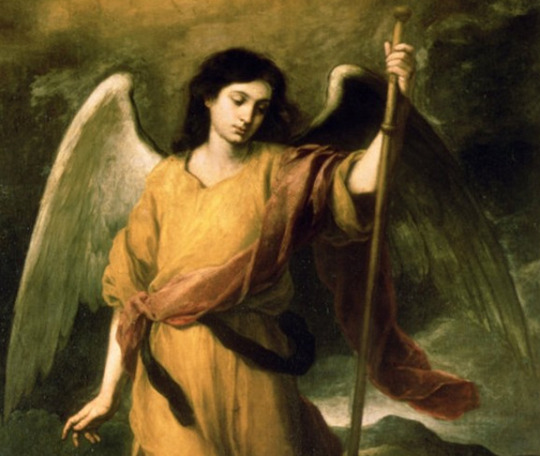
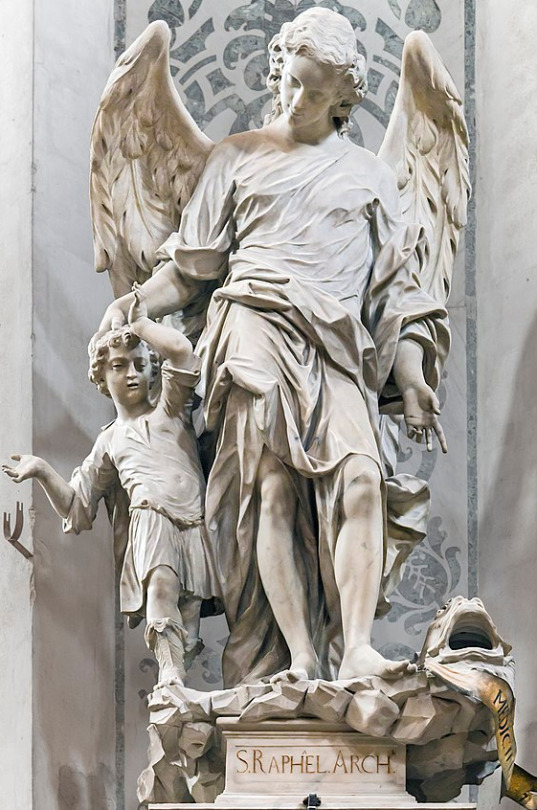

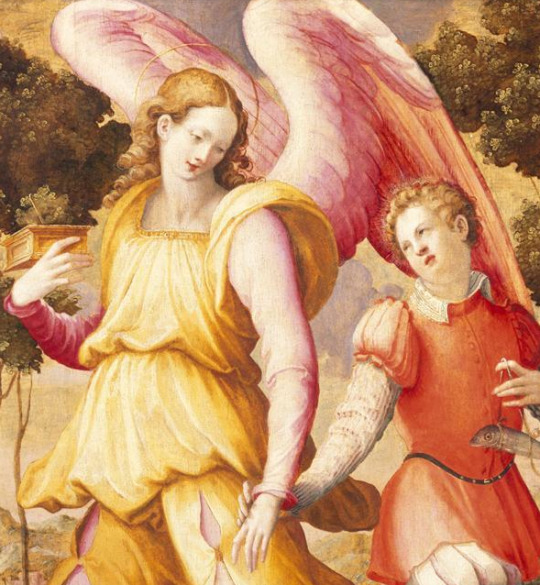
The Archangel Raphael
From Book of Tobit & 1 Enoch
Thank you for 100 followers!
#Raphael#Angel of the Day#Species#From the Original#Archangel Raphael#''Angel of Tobit''#Angel of the Trumpet#Saint Raphael the Archangel by Bartolomé Esteban Murillo#Archangel Raphael by Giuseppe Torretti#The Three Archangels and Tobias by Francesco Botticini#The Archangel Raphael with Tobias by Michele Tosini
36 notes
·
View notes
Text
The List of 75 Books Lost or Excluded from the Bible
Joshua 10:13 KJV
And the sun stood still, and the moon stayed, until the people had avenged themselves upon their enemies. Is not this written in the book of Jasher? So the sun stood still in the midst of heaven, and hasted not to go down about a whole day.
2 Samuel 1:18 KJV
(Also he bade them teach the children of Judah the use of the bow: behold, it is written in the book of Jasher.)
1 Kings 11:41 KJV
And the rest of the acts of Solomon, and all that he did, and his wisdom, are they not written in the book of the acts of Solomon?
𝑇ℎ𝑒𝑠𝑒 𝑎𝑟𝑒 𝑐𝑒𝑟𝑡𝑎𝑖𝑛𝑙𝑦 𝑚𝑢𝑠𝑡 𝑟𝑒𝑎𝑑𝑠...
The Protevangelion
The Gospel of the Infancy of Jesus Christ
The Infancy Gospel of Thomas
The Epistles of Jesus Christ and Abgarus King of Edessa
The Gospel of Nicodemus (Acts of Pilate)
The Apostles’ Creed (throughout history)
The Epistle of Paul the Apostle to the Laodiceans
The Epistles of Paul the Apostle to Seneca, with Seneca’s to Paul
The Acts of Paul and Thecla
The Epistle of Clement
The Second Epistle of Clement to the Corinthians
The Epistle of Barnabas
The Epistle of Ignatius to the Ephesians
The Epistle of Ignatius to the Magnesians
The Epistle of Ignatius to the Trallians
The Epistle of Ignatius to the Romans
The Epistle of Ignatius to the Philadelphians
The Epistle of Ignatius to the Smyrneans
The Epistle of Ignatius to Polycarp
The Shepherd of Hermas (Visions, Commands, and Similitudes)
Letter of Herod To Pilate the Governor
Letter of Pilate to Herod
The Lost Gospel of Peter
The Epistle of Polycarp to the Philippians
Book of Enoch 1
Book of Enoch 2 (known as The Secrets of Enoch)
Enoch 3
Book of Esdras 1
Book of Esdras 2
Book of Maccabees 1
Book of Maccabees 2
Book of Maccabees 3
Book of Maccabees 4
Book of Maccabees 5
Book of Tobit
Book of Jasher
Book of Judith
Book of Esther
Book of Ecclesiasticus / Sirach
Book of Jubilees
Book of Baruch 1
Book of Baruch 2
Book of Baruch 3
Book of The Shepherd of Hermas
Book of Wisdom / Wisdom of Solomon
Book of The Psalms of Solomon
Book of The Odes of Solomon
Book of Giants
Book of Adam and Eve 1
The Conflict of Adam and Eve with Satan
The Gospel of James / The Protevangelion
The Gospel of Peter
The Gospel of Thomas
The Gospel of Nicodemus / Acts of Pilate
The Syriac Infancy Gospel / Infancy of Jesus Christ
The Epistles of Jesus Christ and Abgarus, King of Edessa
The Epistle of Aristeas
The Epistle of Jeremiah
The Epistle of Paul the Apostle to the Laodiceans
The Epistles of Paul the Apostle to Seneca
The Epistle of Pilate to Herod
Assumption of Moses
Apocalypse of Moses
Testament of Abraham
Apocalypse of Abraham
Testaments of the Twelve Patriarchs
The Acts of Paul
The Acts of Paul and Thecla
The Apostles Creed
Psalm 151
Story of Susanna
Story of Bel and The Dragon
Story of Ahikar
The Prayer of Azariah and the Songs of the Three Holy Children
Prayer of Manasseh
#christian blog#bible reading#bible scripture#christian doctrine#bible fandom#bible#jesus#christian quotes#biblical#christian living#christainity#christian faith#christian bible#christianity#jesus christ#bible verse#bible study#bibleposting#biblical scripture#bibledaily#read your bible#king james bible#holy bible#follow jesus#faith in jesus#jesus is coming#belief in jesus#jesussaves#salvation#gospel
22 notes
·
View notes
Text
ok wait so
Crowley isn’t Raphael. very sorry.
but i think Aziraphale might be. Two quick things to consider:
Firstly - Aziraphale and Raphael.
Secondly - we know Neil pulls from different religions for Good Omens. In Islam, Raphael is Israfil.
Phonetics aside, let’s break it down a little. I'm gonna lay out some points all onto the table and we'll sort them at the end.
In Christianity and Judaism, Raphael is a healer. In The Book of Tobit, he is disguised as a human, and acts as a physician and expels demons.
In Christianity, he is the patron of of travelers, the blind, happy meetings, nurses, physicians, marriage, Catholic studies, medical workers, and matchmakers.
In Islam, Israfil's job is to hold a trumpet to his lips at the ready for The Second Coming.
In astrology, he's associated with the sun, and, if we wanted to throw Milton a bone - in Paradise Lost, he's assigned to Eden to warn Adam of the consequences of eating the apple.
In season 1, we see Aziraphale heal Anathema, and in season 2, we see him almost excited to heal wee Morag. In episode three, we also see him pretending to be a doctor, although I think this has less to do with his character and more to do with the plot of the episode. Obviously, the expels demons part... he's not too hot at that, considering he certainly didn't expel Crawly. But it was absolutely in his job description.
That matchmaker thing feels almost too on the nose.
In season two, the Metatron asks Aziraphale to rejoin heaven as an archangel to carryout the second coming, which parallels Israfil's job (of course, we have no idea what kind of work he's about to do up there. Maybe he'll be doing paperwork, maybe they'll have him ready with a trumpet to announce the second coming. I certainly don't know.)
And, of course - Raphael is associated with the sun; the sun rises in the east; Aziraphale is the guardian of the eastern gate. And the idea that Neil might have pulled from Paradise Lost is a bit of a stretch, but we have another parallel if I'm not overreaching.
Of course, there's a lot that would prove me otherwise. And I am often wrong! I am also sick right now, so I might be very wrong.
#good omens#good omens season 2 spoilers#good omens season 2 theories#good omens headcanons#crowley#aziraphale#i need to go sleep
33 notes
·
View notes
Text
Hearing the US Speaker of the House...
Talk about how he believes that the law of the United States was founded on Biblical Principles and Bible teachings, I have the urge to ask him:
Which Bible?
See, not many people know this, but different denominations/sects of Christianity have different books in their copies of the Bible. The biggest difference is that Catholic Bibles have more books in them -- Maccabees 1 and 2, Tobit, Judith, Sirach, Wisdom, and Baruch.
On top of that, the books of Daniel and Esther are slightly longer in the Catholic and Orthodox sects in comparison to Protestant Bibles.
That's a lot of differences, and that can alter the meaning of things.
So, when a man gets up and says "The United States was founded on Biblical Principles!"
Ask him Which Bible.
Because he doesn't understand that the US was specifically founded NOT on a Bible to avoid sectarian violence.
Let these fools invite what they sew earlier than they expect.
#Bible#Religion#Christianity#Catholicism#Protestantism#And that's not even getting into the edits and additions the books have had over time!
25 notes
·
View notes
Note
an old post but
a lot of protestant bibles do include the deuterocanon, they are just labelled as apocrypha so people know they aren't canon
Hi, anon! An old post? Is it even a month old? XD
You are right about this -I did meant the whole thing as a bit of a lighthearted joke. But I also think it is true that because they are labeled as apocrypha, they are not really read, generally speaking, and that's what the "they don't even have Judith" meme was going for. But I'm curious now, so let's make a poll:
*I am aware that there's more books that are accepted as canonical between Orthodox Christians, but that would make the poll much more complicated.
35 notes
·
View notes
Text
I now am taking this kinswoman of mine, not because of lust, but with sincerity
Daily Verse Reading – Tobit 6: 10-11; 7: 1; 9-17; 8: 4-9
Tobit 6:10-11
Raphael’s Instructions10 When he entered Media and already was approaching Ecbatana,[a] 11 Raphael said to the young man, “Brother Tobias.” “Here I am,” he answered. Then Raphael[b] said to him, “We must stay this night in the home of Raguel. He is your relative, and he has a daughter named Sarah.
Tobit 7:1
Arrival at Home…

View On WordPress
0 notes
Text



‘One day you’re going to kill yourself if you keep on being this reckless, Raph…’ Steve mumbled as he lit the lighter, knowing too damn well that his new friend can only fall from Heaven’s grace but in no way dying. // or AU where Eddie’s second name is Raphael and he is the one and only archangel Raphael, coming on earth with a mission and getting in touch with this religious man that is hopelessly helping everyone but himself // It can also be the normal Universe in which Steve finds out Eddie’s second name is Raphael and it’s the name uncle Wayne gave to him when he adopted the boy. And until now Eddie lived up to his second name the best. This name derives from a Hebrew root, from the verb ‘to heal’ לרפא - and combined with this amazing particle ‘el’ that translates to ‘god’ - concludes in Raphael meaning ‘God has healed’. Also if you are familiar with the Book of Tobit, this archangel expels demons and he got to bind the one and only Asmodeus. And if you are familiar with 1 Enoch, you sure know that Raphael has the purpose of healing the earth which the fallen angels have defiled. Idk man, I love this name and I love this archangel and Eddie sure fits this name 🥺
#drawing#fanart#steddie#digital illustration#stranger things 4#eddie munson#digital art#my artwork#portrait#stranger things#joseph quinn#eddie the banished#digital artwork#angels
310 notes
·
View notes
Text
Hey everyone! I'm so so soooo sorry that I didn't post until Today. I was going to post on Monday, but I needed to completely rewrite my Education Midterm, and that took away all my free time
We have a number of Biblical Texts that were, for one reason or another, not included in our modern Bible. The Books of Enoch, the history of the Maccabees, Tobit. We can guess what to do with them, but we don't have to, because Joseph did:
"Verily, thus saith the Lord unto you concerning the Apocrypha—There are many things contained therein that are true, and it is mostly translated correctly; There are many things contained therein that are not true, which are interpolations by the hands of men. Verily, I say unto you, that it is not needful that the Apocrypha should be translated. Therefore, whoso readeth it, let him understand, for the Spirit manifesteth truth;" (D&C 91:1-4)
So, the Apocrypha is true, but also not. It's more like the Apocrypha is true, but you need to have the Spirit to understand it. It's like the Book of Revelation in that way
I have a lot to say about the Apocrypha. It's a wealth of interesting stories and information. But, I'll just tell you to go study it yourself
Journal of Discourses
I don't know if anyone here has read the JoD, but I have. Since I have a life outside of Mormon Scholarship (for now) I haven't read all 26 Multi-Hundred page Volumes. But there's some interesting stuff in there. From Brigham alone, we get the Garden Cosmology, Instructions for a Zion Community, the Cumorah Cave, and the idea that keeping Kosher is more important than the Word of Wisdom (and that's just the beginning). Now, we don't believe in any of that stuff (his view of Zion has more communalism than most Mormons would be comfortable with), but there's plenty of stuff we do believe. This is why I see the JoD as Mormon Apocrypha.
Actually, I would compare it to the Jewish Talmud. The Jerusalem & Babylonian Talmuds were written in an age of chaos for the Jewish Community, and it was written to build regulations based on the Oral Law. The JoD were written in Polygamy-era Utah, after the Church shattered, with many questions left after Nauvoo (with the Endowment, the King Follet & Grove Sermons, and others left unexplained to the vast majority of the Church). This caused much debate, like Orson vs Brigham on who Heavenly Father is. We accept much of what is in there, but not everything (just like how a Jewish person can accept Hillel's ruling on one issue, and Shammai's on another).
I'm not going to recommend everyone read the JoD though. There's a lack of Scholarship about it, it can lead to weird places (Adam did it with Mary, Sun People & Moon Quakers, ect), and it's kind of a slog between the insanity. It's a Milk/Meat situation, but if you're ready for the Meat, and have the Spirit, then go ahead
Interesting Reads
"Strange Thing in the Land"- https://www.reddit.com/r/latterdaysaints/s/IusTpLg48v
Journal of Discourses- https://journalofdiscourses.com/
https://rsc.byu.edu/apocryphal-writings-latter-day-saints/whose-apocrypha
https://www.ldsliving.com/5-teachings-from-the-apocrypha-latter-day-saints-can-learn-from/s/89576
I can't think of any questions to ask. If you have any, add to the Comments
8 notes
·
View notes
Note
Hi! I had a question about angelology after reading your lovely post, and I thought maybe you would have an answer (or at the very least opinions), but also no pressure to answer :)
I always thought Gabriel was the highest ranking angel as an archangel, but according to the actual ranking of angels, archangels are pretty far down on the list! Also, Aziraphale was guardian of the Eastern Gate, but I know he’s a principality and not a cherubim. And then there’s Muriel being a 37th rank angel (or something along those lines) which I feel like adds a whole other ranking system? I admittedly know almost nothing about angelology outside your post, so I guess my question was what are your thoughts on the ranks of the other angels in the show that (at least to my knowledge, but I could be totally misinterpreting things) are contradictory to the three ranks??
I mostly find it interesting that the show mentions thrones and dominions being the higher-up angels but then Gabriel being an archangel really threw me off. Anyway, thanks for the post!
Hi! Thank you for your question! Highly appreciated.
First of all, I would like to clarify that the angelology I study is Christian Catholic Angelology, so I'm sorry in advance if someone's confused.
Gabriel and his ranking
With arcangels we might get a little bit confusing, because we have the arcangels and The Archangels.
The last one are the Messengers of God, They're the ones who receive the most important messages from God that need to be delivered to humans.
Ex. The Archangel Gabriel is the one who told Mary she'll be giving birth to Jesus (in the flashback of Job in ep 2 this hasn't happened yet so that why he doesn't say anything about it)

Catholic church recognizes 3 of the 7 Archangels: Gabriel, Michael and Raphael.
• Michael - Recognized by The Bible, the one who fought against Lucifer, chief of "The Army of Yahweh"
• Gabriel - The Celestial Messenger
• Raphael - Recognized by The Book of Tobit, The Healer of God
Another possible interpretation we have of The 7 Archangels is that these are the seven spirits of God who are before the throne described in the Book of Enoch and in the Book of Revelation (Rev 1:4, 3:1, 4:5, 5:6).
They are said to be the guardian angels of nations and countries, concerned with the issues and events surrounding them, including politics, military affairs, and commerce.
Ex. Archangel Michael is known for being the protector if Israel.

Examples of archangels are
• Raziel
• Camel
• Zadkiel
• Yahoel
• Cassiel
Aziraphale and his ranking
Neil just confirmed Aziraphale was a Cherub at the Garden of Eden. We can confirm this by the proximity to God and "upstairs" in ep 1.

"You know, the current word from upstairs is that we'll be shutting this all down again in about 6,000 years"
- Aziraphale (S2E1 03:05)
"Now that's [Earth] where people that we're currently designing are going to be. I've seen the plans".
- Aziraphale (S2E1 03:47)
Fun fact: Uriel (Fire of God) was the one with the flamming sword to avoid humans access to The Tree of Life (mention in The Book of Adam and Eve) and the one of warned Noah about the flood. I found very interesting that they chose Aziraphale in those parts.

In my previous post about Angelology, we see the ranks, a Cherub being in the 2nd chorus of the 1st rank and a Principality being in the 1st chorus of the 3rd rank.
So, in Christian Catholic Angelology, he got a demotion.
Muriel and their ranking
In season 2 we know that Muriel is 37th order scrivener.

Scriveners are actually in the bible, but they're not angels; basically, they copy manuscripts and other texts as well as secretarial and administrative duties, also they're the one whose occupation is to draw contracts or prepare writings, that's why we see Muriel doing the authenticity verification of the permit Crowley had in ep 2.

Ranking of angels
We have different ranking of angels depending on the religion, because each one might have the same name of the chorus (rank) but in different hierarchy (and also another type of ranks), it could be pretty confusing at some point. I personally follow the Christian Catholic Angelology.
I adore how they include Crowley and Aziraphale in biblical events, because based of their personalities it totally fit, which I think is pretty amazing.
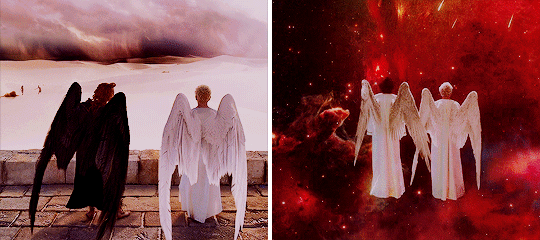
I hope my answer helped!
#good omens#ineffable husbands#aziraphale#crowley#gos2#good omens 2#aziracrow#good omens season 2#Angelology#Christian Catholic Angelology#season 2#Gabriel#Muriel#Angels
18 notes
·
View notes